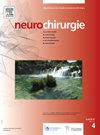Changes in patient-perceived balance and vestibular function after Gamma-knife stereotactic radiosurgery for vestibular schwannoma: 12-month outcomes in a single-centre pilot study
IF 1.4
4区 医学
Q4 CLINICAL NEUROLOGY
引用次数: 0
Abstract
Background
Hearing outcomes are well-documented for patients with vestibular schwannoma (VS) treated with Gamma Knife stereotactic radiosurgery (GK-SRS). However, how GK-SRS affects patient-perceived balance and vestibular function remains unclear. This study therefore evaluated changes in these parameters one-year post-treatment.
Methods
A prospective, observational, before-and-after, pilot study was conducted on patients with unilateral VS treated with GK-SRS between June 2021 and July 2022. Balance-related handicap was assessed using the Dizziness Handicap Inventory (DHI). Objective vestibular function was evaluated through caloric tests and video head impulse tests (VHIT). Data were compared before treatment (0 M) and 12 months after treatment (12 M).
Results
Thirty-eight patients were included (median age 69 years, 52.6% male). Median total DHI scores significantly deteriorated (14 [5; 24] at 0 M vs. 18 [8;40] at 12 M, p = 0.027), with an increase in cases classed with moderate handicap (12%–29%, p = 0.025). We found a significant deterioration in median caloric deficit at low frequency (49 [29; 78]% vs. 72 [40; 87]%; p = 0.012) and a significant deterioration in median vestibulo-ocular reflex (VOR) gain of the anterior semicircular canal (SSC) at high frequency (0.94 [0.86;1.04] vs. 0.9 [0.72;0.98]; p = 0.012). Change in DHI score was only found weakly inversely correlated with change in VOR gain for the affected-side posterior SSC (r = −0.38; p = 0.04).
Conclusion
GK-SRS for VS can result in modest deterioration in subjective balance after one year. Changes in DHI were not strongly correlated with objective vestibular function deficits thus suggesting other factors can contribute to dizziness and balance outcomes.
伽玛刀立体定向放射治疗前庭神经鞘瘤后患者感知平衡和前庭功能的变化:一项单中心先导研究的12个月结果
背景:前庭神经鞘瘤(VS)患者接受伽玛刀立体定向放射手术(GK-SRS)治疗的听力结果有充分的文献记载。然而,GK-SRS如何影响患者感知的平衡和前庭功能仍不清楚。因此,本研究评估了治疗一年后这些参数的变化。方法:对2021年6月至2022年7月期间接受GK-SRS治疗的单侧VS患者进行前瞻性、观察性、前后对照的试点研究。使用眩晕障碍量表(DHI)评估与平衡相关的障碍。目的通过热量测试和视频头脉冲测试(VHIT)评估前庭功能。比较治疗前(0 M)和治疗后12个月(12 M)的数据。结果:纳入38例患者(中位年龄69岁,男性52.6%)。DHI总分中位数显著恶化(14 [5;[8;40]在12 M时,p = 0.027),中度残疾的病例增加(12%至29%,p = 0.025)。我们发现,在低频率时,中位热量赤字显著恶化(49 [29;78 % vs 72 [40;87] %;p = 0.012),高频前半规管(SSC)的前庭-眼正中反射(VOR)增益显著下降(0.94[0.86;1.04]vs 0.9[0.72;0.98];p = 0.012)。DHI评分的变化仅与后侧SSC受累侧VOR增益的变化呈弱负相关(r=-0.38;p = 0.04)。结论:GK-SRS治疗VS可导致一年后主观平衡轻度恶化。DHI的变化与客观前庭功能缺陷没有很强的相关性,因此表明其他因素可能导致头晕和平衡结果。
本文章由计算机程序翻译,如有差异,请以英文原文为准。
求助全文
约1分钟内获得全文
求助全文
来源期刊

Neurochirurgie
医学-临床神经学
CiteScore
2.70
自引率
6.20%
发文量
100
审稿时长
29 days
期刊介绍:
Neurochirurgie publishes articles on treatment, teaching and research, neurosurgery training and the professional aspects of our discipline, and also the history and progress of neurosurgery. It focuses on pathologies of the head, spine and central and peripheral nervous systems and their vascularization. All aspects of the specialty are dealt with: trauma, tumor, degenerative disease, infection, vascular pathology, and radiosurgery, and pediatrics. Transversal studies are also welcome: neuroanatomy, neurophysiology, neurology, neuropediatrics, psychiatry, neuropsychology, physical medicine and neurologic rehabilitation, neuro-anesthesia, neurologic intensive care, neuroradiology, functional exploration, neuropathology, neuro-ophthalmology, otoneurology, maxillofacial surgery, neuro-endocrinology and spine surgery. Technical and methodological aspects are also taken onboard: diagnostic and therapeutic techniques, methods for assessing results, epidemiology, surgical, interventional and radiological techniques, simulations and pathophysiological hypotheses, and educational tools. The editorial board may refuse submissions that fail to meet the journal''s aims and scope; such studies will not be peer-reviewed, and the editor in chief will promptly inform the corresponding author, so as not to delay submission to a more suitable journal.
With a view to attracting an international audience of both readers and writers, Neurochirurgie especially welcomes articles in English, and gives priority to original studies. Other kinds of article - reviews, case reports, technical notes and meta-analyses - are equally published.
Every year, a special edition is dedicated to the topic selected by the French Society of Neurosurgery for its annual report.
 求助内容:
求助内容: 应助结果提醒方式:
应助结果提醒方式:


